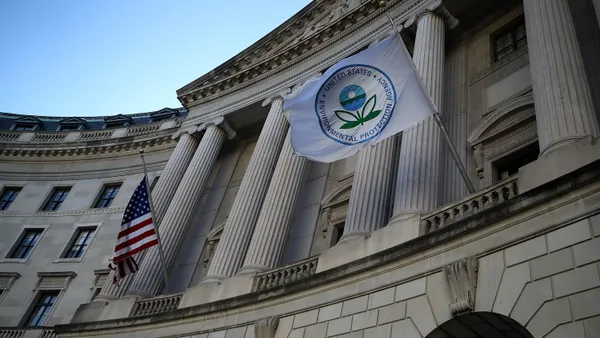Dive Brief:
- The Kansas House of Representatives approved a Slow Down to Get Around bill by a vote of 111-8. The bill now sits in committee in the Kansas Senate. The Kansas legislature is in recess, however.
- The Maryland House of Delegates and the Maryland Senate both approved a slow down bill, (138-0 and 45-0) and the bill has been sent for Gov. Larry Hogan's consideration. A spokesperson for Hogan told Waste Dive the governor will "consider the legislation once it has been presented," but would not answer if he had any intention to sign or reject the bill. Maryland's legislative session ended April 9.
- A bill passed in the Ohio Senate, but is stuck in committee in Ohio's House of Representatives. The regular Ohio legislative session ended April 11, so the bill is at a standstill.
Dive Insight:
While nothing official has yet happened in Maryland, Solid Waste Association of North America (SWANA) President David Biderman told Waste Dive his organization expects Hogan to sign the bill into law within 30 days.
"Getting these laws passed is important, but what we really need to do is reduce bad driving behavior, by both some drivers in the industry, and by the general public," Biderman said in an email.
President of the National Waste and Recycling Association (NWRA), Darrell Smith echoed Biderman's sentiment. Smith said NWRA chapters in at least nine states pushed for slow down bills. He said the NWRA was "very happy" with the progress that's been made so far this year.
"We are committed to making our industry safer and will continue to actively support efforts to pass Slow Down to Get Around legislation in states that do not have those laws," Smith said in an email.
As refuse collection remains one of the most dangerous jobs in the country, legislation to protect workers is almost always seen as welcome by the industry. The year started with some high-profile incidents, including an Amtrak train carrying Congressional Republicans hitting a collections truck in Virginia.
At the same time, 2018 has been so far an active year for organizations and governments looking to improve safety. The New York City Business Integrity Commission, for example, published a first-of-its-kind commercial waste safety manual. SWANA is starting a program that has potential to reach an even wider audience. After a string of fatalities in January, SWANA also announced it was starting a chapter-based small hauler outreach program, in order to share safety best practices with smaller companies that might not have the large safety budgets and infrastructure of bigger companies.
However, the conversation cannot stop at driver behavior, as Biderman alluded to. In addition to ensuring safe practices by drivers, the industry should look for opportunities to inform the public of the safety risks associated with refuse collection. Slow down bills can be an effective way of doing that outreach, as can be events and observations like "Garbage Man Day."










